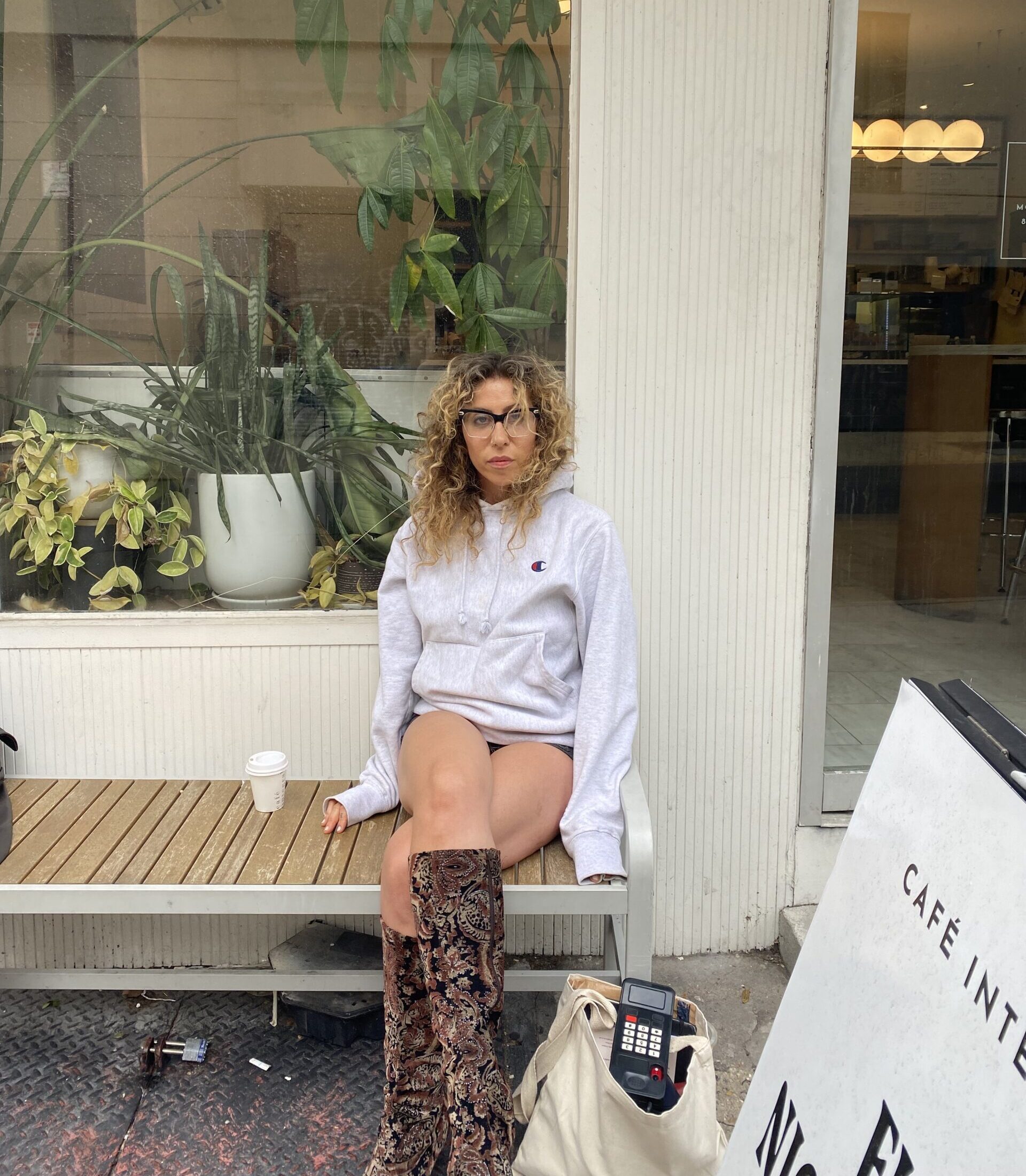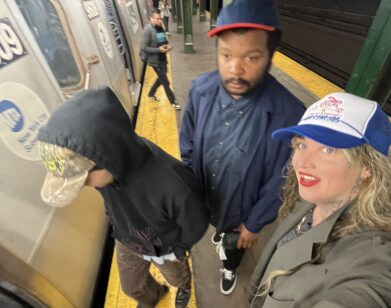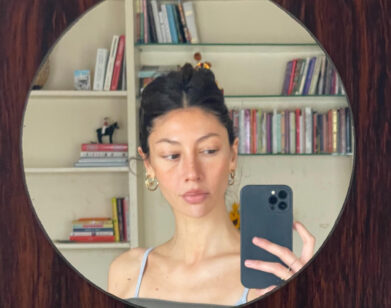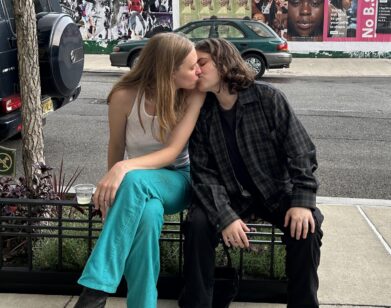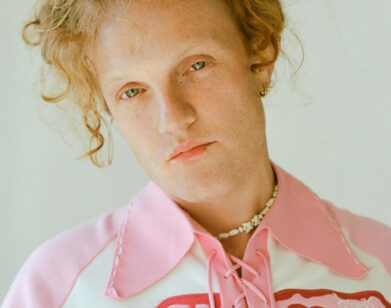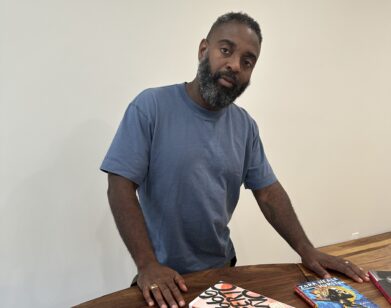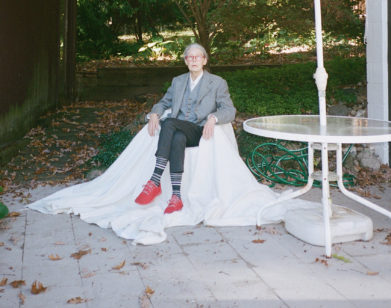POETRY
Poet Ariana Reines Isn’t Afraid of Saying the Wrong Thing
Six pages into her new book Wave of Blood, Ariana Reines writes, “I’m bleeding. I don’t know why whenever anything important or difficult is happening this seems to be the case.” Given the book’s title, it might not come as a surprise that this state of bleeding characterizes the text. Reines’ work has always explored this intermingling of life and death at an elemental level. She writes from a place of knowledge of suffering’s proliferation. “There’s something that we can’t accept about life’s connection to death, about the contingency of our being,” she told me last month.
In a literal sense, Wave of Blood chronicles the author’s travels on her European tour. The book is made up of poems, diary entries, and transcriptions, all time-stamped between October 2023 and April 2024, a period during which Reines was metabolizing both her grief around her mother’s suicide and the crisis in Israel-Palestine while simultaneously teaching Milton’s Paradise Lost. Like much of Reines’ previous work, including A Sand Book (2019), Wave of Blood features experimental forays into the realms of the cosmological, the spiritual, and the physical. And In a style characteristic of the New York School, her work is embodied, often painfully so, as she intrepidly goes where the poem moves her, from Western Europe to the Middle East, through war, ancestral grief, and insanity. A few weeks before the book’s release, we grabbed coffee with Reines to discuss insanity, suffering, and the intensive process of stitching together her latest genre-resistant text.
———
JULIETTE JEFFERS: I like your boots. They’re like, carpet-y.
ARIANA REINES: Thank you. They are indeed carpet-y. I had a session with a psychic yesterday and my ancestors had a lot to say about my footwear.
JEFFERS: Oh, really?
REINES: They were like, “Keep going.”
JEFFERS: Are you drawn to dramatic footwear?
REINES: I’m drawn to dramatic footwear and they were like, “That’s us, and we need you to just stay the course.” I was like, “I’m on it.”
JEFFERS: It might also be a height thing. When you’re short, you need the dramatic footwear.
REINES: I’ve attempted butch and normie phases but it doesn’t really work for me. We all have limits, and some of them are imposed by the cosmos no matter what we may wish.
JEFFERS: We should talk about the book. All of your books are really beautiful. Genuinely, A Sand Book is one of my favorite physical books I own.
REINES: Thank you so much. That means a lot to me. I put a lot of energy into that. I worked in an old-and-rare bookshop when I was in high school and it was my first experience of looking at a lot of books physically. They made such an imprint on my psyche. Even if you don’t read a book, you should be able to get a transmission from it without opening it.
JEFFERS: Exactly. It needs the texture and the size. When I was reading Wave of Blood it felt like a travel diary in many ways.
REINES: Yeah.
JEFFERS: It wanders, and you also wander while you’re writing it. You feel these moments that are really feverish, and then these moments of intense clarity. The book seems to be exploring a feeling of like, “the center will not hold.” And you communicate that through the form.
REINES: Thanks for quoting Yeats. Yeah, it is a travel diary. It’s a chronicle of war, and I happen to be moving around physically throughout it. And also, there’s this strange thing of an atrocity existing in your phone, and also touching the lives, the physical families, and bodies of people you know. And the experience of no escape. You can move all over the planet. It’s a complicity and a complexity that didn’t let go no matter where I was. And then I think there’s an extra porosity that comes with the job of poetry, the body in travel or something. I think Eileen Myles is, to me, the canonical chronicler of that experience of what it means to show up somewhere and let the poetry come through your body. Anything that can happen will be contiguous with poetry. And so the limits of what is and isn’t the poem also become really porous. You’re dilated by grief, by jet lag, by this strange solitude. There’s private grief and collective grief, and both have to somehow be dealt with in this strange space.
JEFFERS: You had a good line about that. It was like, “From time to time a poem saw me, and I moved my body accordingly.” It’s very bodily. While reading it, I felt that power of being a kind of channel for, as you describe it, this orgy of suffering. It’s a remarkable feat.
REINES: It was a horribly difficult process to write, I will say.
JEFFERS: Well, how did you write?
REINES: A lot of it is from my notebook. Some things came out exactly as you see them. I think the best poem in the book, “Absolute Zero,” is in a way the only whole poem that I could stand behind that was provoked by this crisis. It came out just the way it is. It is a made book, and I suffered over it. It was torture. I just couldn’t eat. I couldn’t sleep. It got my body and my soul to an absurd position. But I also felt like, ethically and morally, I’m not in a position to present to the public the normal kind of product that I would think of as a book. This is sort of a self-unsealing text. There are different kinds of writing in it. Some of it is transcribed speech that was made in a relatively private protected space. Some of it is transcribed speech from random places in Europe where I was on this tour and I had no idea who would be there or what the context would be. And then some of it is just my notebook. Theoretically, it seemed like a simple premise.
JEFFERS: But it’s hard to stitch all that.
REINES: It’s actually very hard to stitch all that together. We’re in a moment right now where it’s easy to romanticize what it takes to do that, but it’s actually a deeply strange art. It’s a very peculiar combination of discipline and mystery. It’s not just quieting your inner critic or whatever they say on social media. It’s a very peculiar combination of energies that align to make that possible.
JEFFERS: You have to be a container for all of it, but everything is so leaky.
REINES: It is very leaky. I think “leakiness” is like a good descriptor for our times, for the conditions of this book. I’m going to be corny and quote Kafka. Kafka said, “Literature needs to take an ax to the frozen sea of the heart.” There is something about all the ways that we want to speak about atrocities, about ourselves. Everything is leaking. There’s no clean place to speak from. It doesn’t matter where you are. Morally, politically, and ethnically, nobody’s trauma will justify everything that they could say or feel. There’s no place to speak from that isn’t leaking. So on some level, it was a very emotional and difficult experience to write this. But I hope that it makes people leak.
JEFFERS: I felt that open-heartedness. You’re not afraid to say the wrong thing, too.
REINES: A huge amount of pain was being pulled out of people by this crisis. People were desperately looking for a clean place to stand. That desperation was causing a lot of fucking absurd behavior, and also really weird backflips in language. And I toil in language, which itself is not clean. It’s absurd to live in a time when what people should be most terrified of is saying the wrong thing. That is absurd.
JEFFERS: It’s a very real fear in our culture.
REINES: Of all the things that we could be afraid of doing wrong. It’s not that I am without fear of what I say. But my mother killed herself, and I didn’t really get to have time with that. I felt a personal rage that my own healing and yearning to live was just sucked into yet another war. I have never been an adult when there wasn’t a constant war.
JEFFERS: Me neither.
REINES: And I’m like, “I’m angry about that. And I’m tired of it.” I’m tired of the complicity that everything is dragged and drenched in cruelty. But I also recognize that on some level it’s absurd to want something other than what the world is.
JEFFERS: Right. In A Sand Book, you have this thing about a finite amount of suffering that will always exist on earth.
REINES: It’s interesting that you bring that up. For the folks at home, we’re referring to the final section of my last book, A Sand Book, which was a bunch of stuff that the Sun said. “According to the nature of this age, the world will always sustain the maximum of suffering possible.” I’ve been meditating on this for about 10 years now. Whatever your suffering is on the planet, it’s the maximum. It’s algebra. When the dinosaurs were alive, it was the maximum. In the days of King Tut, it was the maximum. And now, it’s the maximum. And on some level, pretending or believing that we can completely eradicate suffering on this planet is a delusion. But there’s a suggestion that we could structurally lessen it. A Sand Book grappled with this and Wave of Blood even more so. We’re having that disease in our thinking right now a lot. The idea of, “I hate this, this is evil, therefore it shouldn’t exist.” This is making people very crazy. And I should know what crazy is because my mom was fucking crazy. I know crazy when I see it.
JEFFERS: You also have this great wrestling with sanity versus insanity at the end of this book.
REINES: Yeah. I will say, at least from my limited studies, it seems like insanity has always existed. It does seem to evolve with technology. As things change in that domain, people’s insanity responds to technology. In my case, I built my sanity with my own two hands. I crawled through a river of burning shit. And I wanted sanity, that was my holy grail. I think it’s a worthy ambition. In the ’70s, they were really romanticizing insanity. And I’m sure that that served its purpose at that time, but I don’t think that would work now. But sanity is actually a very interesting thing for an artist to seek. I don’t think there’s a clear path to it. There’s no guarantee.
JEFFERS: Let’s talk about the title. Obviously, blood is a big part of your writing. It connects to the kind of immensity of the suffering we see now with the current atrocities in Palestine. It connects to womanhood. And it connects to life and death in a very, very direct way. So how did you decide on the title?
REINES: It just came to me. It was funny talking to the editors and sorting out the title. They were like, “Well, what about Blood Wave?” And I was like, “That sounds like a kind of music.” And I know that my work has been very menstrual and sometimes triggering to my transfem friends and loved ones. The experience of life, also the experience of the feminine cycle, is overwhelming and overwhelmingly violent. It’s also an experience of death that I have never gotten used to. And every woman I know is honest about this in private, but we’re not honest about this in public. And it’s not only a confrontation with life, it’s a confrontation with death. It has overwhelming and horrific elements to it that I don’t think culturally we’ve overcome as a taboo.
JEFFERS: You talk about wanting a history of menstruation almost as a sidebar in the book.
REINES: We need one. I’m imagining an AI Foucault. I’ll make a robot Foucault write a history of menstruation just to punk all of theory for the last 40 years. It’s just hilarious to me that it remains a cultural taboo.
JEFFERS: Totally. And hormones are so powerful. They control so many things and we don’t even understand how they’re controlling them.
REINES: Exactly. I suppose on some subtle level that this taboo has to do with the orgy of violence that we’re witnessing historically. There’s something that we can’t accept about life, that we can’t accept about life’s connection to death, that we can’t accept about the contingency of our being. That has to do with what we’re seeing. And I can’t put into words what that is, but this book is meant to give testimony to that silence.

